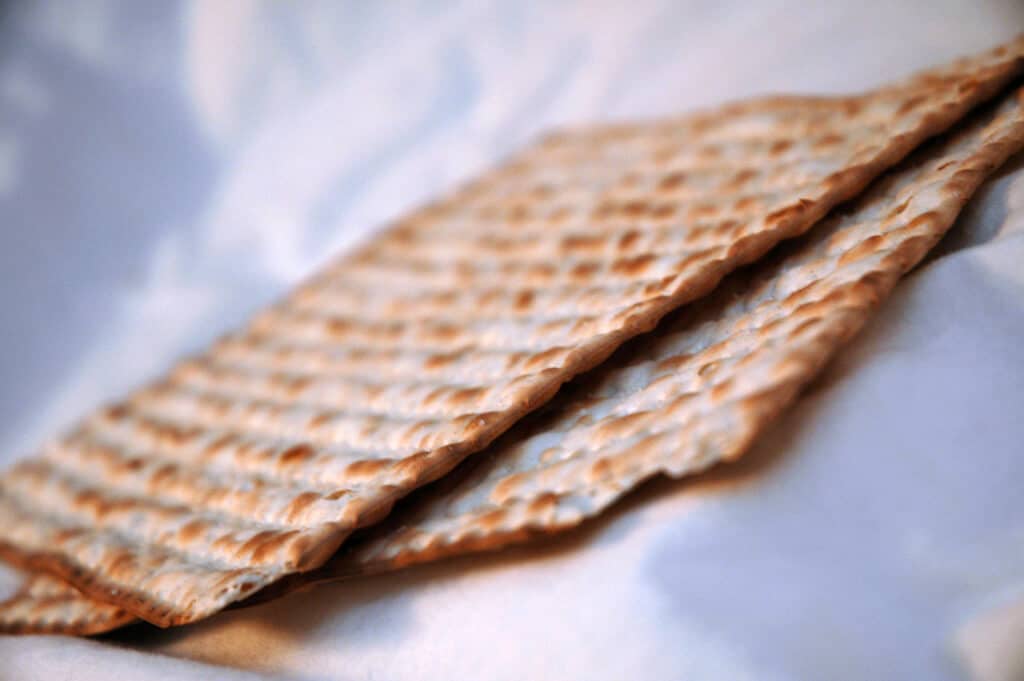Five children kept eyes on the father. They hid behind small Passover haggadahs and counted fingerprints on the prayer book’s cover, fingerprints left behind by Manischewitz wine. Each fingerprint represented a plague upon the Egyptians. Represented stories told and retold by the father.
Dom, Tzfardeyah, Kinim he recited.
Dom, Tzfardeyah, Kinim the five children repeated.
They reached into their wineglass, they copied the father, and they removed one drop of wine on the tip of a finger. The five children carefully pressed the wine into the pages of history. One drop for every plague. They counted thirty-three prints from Aunt Alice. Hers were the color of the rouge smeared on her pointed cheekbones, cheekbones much like her mother’s bone structure. The five children thought of their grandmother’s bones. Thought of the bones as they were crushed on the side of the road between Lodz and Auschwitz. The five wondered what the three extra prints represented. The five recounted, just in case. And they kept eyes on the father. They held one collective breath. The five wondered if this night, or the next, the horseradish would take their father’s life.
The horseradish is good this year, the father said. The five waited, weary.
The father did not notice the five. He held the bitter root while he sliced a large piece from the end. He held it to his nose, inhaled deeply. On the cover of the haggadahs, the extra fingerprints blushed the cheeks of men in silver suits. The fingerprints made unclean the women adorned in brass and jade. Horses with hooves the color of Negev sand flipped in the waves created by Moses. Moses, standing with his arms extended, parted the Red Sea so that the enslaved Jews could pass through. So that the five’s ancestors could escape. They wondered if Moses was on the road from Lodz.
Baruch atah Adonai, the father started, the grated horseradish pressed between two pieces of matzo. The five children repeated the Hebrew blessing over bitter herbs. Al achilat maror. They watched the father as he took a bite. His skin turned red like the soldiers, then blue like the faces of women and horses in the waves. The five wonder if he would survive the bitter herb, if he would grow old like Moses, and live for 120 years.
The horseradish is to blame, the five said quietly.
It was the pharaoh, father corrected.
The five agree, but they knew it was the horseradish.
That night was no different than any other night and the children only watched. They watched as the father made a fist and pounded his heart. His heart so much like their own. They watch his eyes disappear, squeezed tightly. The five took small, childish bites while the father breathed heavily, the membranes in his nose and gums on fire. The blue crept up his neck and around his ears, ears like his father’s. Ears that were buried with beets and horseradish in a Russian forced-labor camp. Ears that do not hear questions the five are unable to ask. And then, the five saw signs of life return to the father’s face. They saw his coloring return to normal, his eyes opened, and he was once again the head of the Passover table.
We should do this again tomorrow night, the father said, sputtering. The five were silent, weary.
I drive home and carry my children to their beds. Their clothes smell like dinner at their grandfather’s home: canola oil, chicken soup, and horseradish. A piece of hair sticks to the cheek of my youngest daughter. She has her Aunt Alice’s cheekbones. I reach down and unstick the stray hair, fold it around her ear, so much like her grandfather’s. There are five of us, each with our own families. I hope she remembers. Before I turn off her bedroom light, I whisper, “The horseradish was good this year.”
–
Shoshana Surek earned her MFA in Creative Writing from the Mile-High MFA in Denver, Colorado. As a daughter of a Holocaust survivor and a first-generation American, her work often revolves around the themes of identity, religion, and family. Her short stories and poems have appeared or are forthcoming in Vestal Review, 2(e), University Press, and f(r)iction. One of her stories, “Masking Tape Over My Fortunate One,” was nominated for a 2017 Pushcart Prize.
Lead image: “Passover – Shalom” (via Flickr user paurian)

